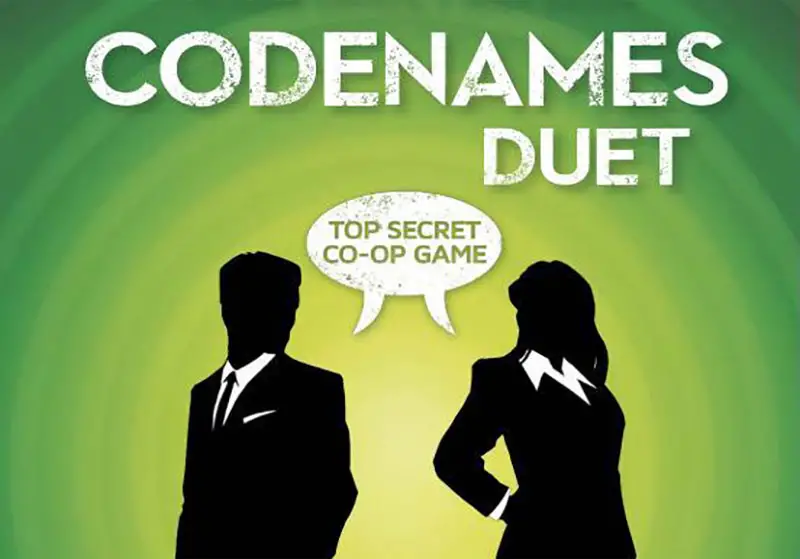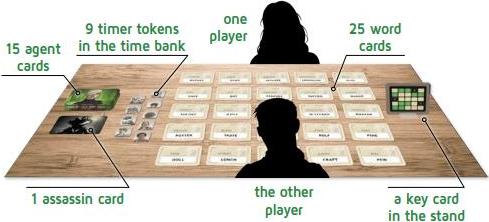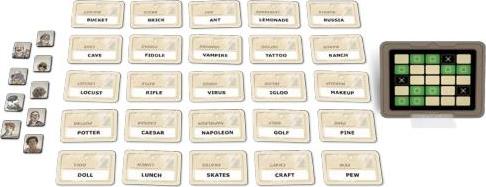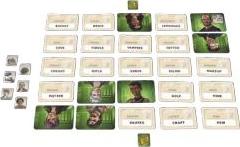
Two covert operatives are on a secret mission in a crowded city. Each knows 9 secret agents that the other must contact. Communicating in coded messages, they sneak past enemy assassins in an attempt to complete their mission before time runs out.
Codenames: Duet is a cooperative word game for two or more players. A key card gives you 9 words to give clues for and 3 words your partner must avoid. A clue is only one word, but it can point to multiple words that you want your partner to guess. Your partner also gives you clues for the words you need to find.
If you both find all the words before you run out of turns, you both win.
Setup
You and your partner should sit on opposite sides of the table.
Shuffle the word cards and deal 25 at random into a 5 × 5 grid, as shown.
Place the green agent cards and the assassin card where both players can reach them.
Place 9 timer tokens bystander side up beside the word grid, as shown above. This forms the time bank.


Leave 2 timer tokens in the box. Only 9 tokens are used in the standard game. However, this game is quite challenging. A 10th or 11th token can be added to make it a little easier. These extra tokens are colored blue to remind you to use only 9 in the standard setup.
Set the plastic stand beside the word grid. Shuffle the deck of key cards and draw one at random.
Place the key card in the plastic stand so that each player sees only one side of the card. The card should be wider than it is tall, as shown above. Either wide edge can be on top.
Tip: If you hold the deck vertically and draw from the middle, then you will see only your own side of the card.
Duet Key Cards
Each game has 1 double-sided key card. On your side of the card, 9 words are marked in green. These are the words you want your partner to guess.
You also see 3 assassins marked in black. If your partner guesses one of these words, you both immediately lose the game.
The other words are innocent bystanders - people who get in the way. If your partner guesses one of these words it is an incorrect guess. Your partner also sees 9 green words and 3 black words, but they are mostly different words. Your partner will give you clues for the words that are green on the side of the card that you can't see.
Object of the Game
You both win if you can find all 15 words in nine turns or less.
Note: You are each giving clues for 9 green words, and 9 + 9 is more than 15, but some words appear green from both sides. Details are on the back page.

If you already know Codenames, you still need to learn these rules. The core idea is the same, but most of the details are different. The key card is double-sided so you and your partner can take turns giving each other clues.
Timer tokens are used to limit your number of turns. And a word that looks like a green agent on your side of the key card might be something completely different on turns when you are the guesser.
Game Play
Start the game by looking for a clue that will lead to two or more green words. Your partner will also be looking for a clue for words that are marked green on the other side of the card.
Giving A Clue
A clue is one word and one number. The number tells how many words on the table relate to the word in the clue.
For example, Weather: 2 might be a good clue for STORM and RAINBOW.
The word in your clue cannot be one of the words visible on the table. So in the example above, storm: 2 would be an invalid clue. Rain: 2 would also be invalid because rain is part of RAINBOW. Full details are on page 10.
It is legal to give a clue for only one word, but you will have to give some clues for two if you want to win the game. A successful clue for three or more words is a big accomplishment.
The First Clue
Either player may give the first clue. Let's suppose you find a good one while your partner is still looking, so you offer to give the first clue. You say a word and a number … and nothing else. Now your partner tries to figure out which words you meant.
Making A Guess
On a turn when you give the clue, your partner will make guesses. Your partner takes time to look at all the words on the table. Then he or she makes a guess by touching one of the word cards.

If your partner touches a word that you see as green, that is a correct guess. Cover it with a green agent card. Your partner has made contact with one of your agents and you are one step closer to winning the game.
Note: You cover a green word with a green agent card even if it wasn't one of the words you meant. Do not let your partner know. You should act like you meant that word.

If your partner touches a word you see as black, that is an assassin. The game is over and you both lose. Your partner went down a dark alley looking for a contact and got caught by the assassins.
If your partner touches a word you see as tan, mark it with a timer token. Take a token from the time bank and place it on the word card, bystander side up, with the arrow pointing from you to your partner.
This indicates that when you gave a clue, your partner guessed this word and ran into an innocent bystander. Do not cover the word. This still might be a word that your partner wants you to guess.
Running into an innocent bystander ends the turn immediately, and running into an assassin ends the game. On the other hand, finding a green word gives your partner a chance for another guess.
One Clue, Multiple Guesses
Your partner can make another guess if the first guess was correct. (You do not give another clue). The second guess is made the same way as the first, and you mark the word according to the same rules. If that guess is correct, your partner can guess again. And again. Your partner can make an unlimited number of correct guesses.
Ideally, your partner will find all the words indicated by your clue. Of course, it doesn't always work out that way.
End Of The Turn
Each turn has exactly one clue and at least one guess. Assuming you don't run into an assassin, there are two ways a turn can end:
A wrong guess ends the turn. If your partner touches an innocent bystander, you mark it with a timer token from the time bank and the turn ends.
After one or more correct guesses, your partner may choose to end the turn by taking a timer token from the time bank. The token is kept check mark side up in front of your partner.
A turn always uses up a timer token. The number of timer tokens left in the time bank is the number of turns (and the number of clues) left in the game.
If everything goes well, your partner will guess as many words as you indicated by your clue and then stop. But your partner may choose to quit early. It is also legal for your partner to take additional wild guesses, but we don't recommend it.
Next Turn
You and your partner will take turns giving clues. So if you gave the clue on the first turn, your partner gives the clue for the next turn.
When you are guessing, only your partner's side of the key card is relevant. The words your partner wants you to guess could appear green, tan, or even black on your side.
You should focus on the words and ignore the key card.
A word that is covered by a green agent card does not need to be guessed anymore. In particular, if you guess a word that looks green from both sides of the card, your partner will cover it, and neither of you will give clues for it anymore. (If this happens, do not tell your partner that you were also giving clues for that word).
A word marked by a timer token might need to be guessed by the other player. For example,if your partner guessed a bystander, you should have marked it so that the arrow on the token points from you to your partner. Here is what can happen if you guess that word:
Your partner might see it as an assassin, in which case you lose the game.
Your partner might see it as an innocent bystander, in which case your partner marks it with a second timer token, with the arrow pointing toward you. The timer tokens should be arranged to cover the word, since neither of you can guess it again.
Your partner might see it as a green agent, in which case your partner covers it with a green agent card. The timer token should be put on top of the agent card to remind you of what happened on the earlier turn.
Using Clues From Earlier Turns
You might not find all the words related to your partner's first clue. Maybe your turn ended early because of a wrong guess, or maybe you chose to end it early because you weren't willing to risk running into an assassin.
When it is your turn to guess, keep previous clues in mind. You are not required to guess words related to the current clue. You can guess words related to any clue you have been given. Sometimes you might want to guess the words you are most sure of first, even if they do not relate to the current clue.
This is also important to keep in mind when you are thinking up clues. Your partner will have another chance to guess a word he or she missed on your first clue, so it might not be necessary to give another clue for that same word.
Guessing The Last Word
If all 9 words that you see as green have been covered by agent cards, tell your partner that he or she has no words left to guess. Your partner will be the one who gives clues on all remaining turns.
Example Of Play
You have the words and key card shown here. You have a good clue for 3, so you offer to start. You say salad: 3.
Your partner touches RANCH, because ranch dressing can go on a salad. You cover RANCH with a green agent card. Confident she has the right idea, she touches RUSSIA, because she just learned how to make Russian dressing.
The incorrect guess ends the turn. You mark RUSSIA with a timer token, bystander side up. The arrow points from you to your partner. It is now your partner's turn to give a clue. After some thought, she says Waterloo: 2. You touch NAPOLEON and she marks the word with a green agent. That word happened to be green on your side, too, but you don't tell her that. The other word for Waterloo is hard to find. Maybe your partner thinks the Battle of Waterloo happened in Russia?
You touch RUSSIA. Your partner marks it with a green agent card. It already has a timer token, so she puts this on top of the agent card. You have no reason to take a wild guess, so you take a timer token from the time bank and place it in front of you with the checkmark side up.
(Your partner was actually giving a clue for NAPOLEON and RIFLE. But RUSSIA was also green on her side of the card, so it counts as a correct guess. She is not supposed to give any of this information away, so she acts as though RUSSIA was exactly the word she meant).
It is your turn again. You say miniature: 2, hoping to get DOLL and ANT. Your partner touches DOLL. You cover it with a green agent card.
She's not sure about the other miniature word, but she has figured out that you might eat a salad for lunch. She touches LUNCH. You mark it with a green agent card. Her hand hovers over LEMONADE, something else you might have at lunch.
Your stomach tightens, because that word is an assassin, but you act calm, as though it would not bother you at all for her to pick that word. Fortunately, she remembers there is something called a Caesar salad. She touches CAESAR, and you cover it with a green agent card. You do not sigh with relief, because that would give too much away. She touches ANT. You cover ANT with a green agent card.
Your partner ends the turn by taking a timer token from the time bank. You have 6 turns left and the board looks like this:
End of the Game
Clear Victory
Once all green words from both sides of the card have been guessed, both players win the game! There are 15 agent cards and 15 words to guess. (There are 9 on each side, but 3 overlap).
So you win when the last agent card is placed. Of course, there are other possible endings:
Assassin
If either player guesses a word that the other player sees as black, your team has been caught by the assassins and you both lose.

Sudden Death
If you have used up your last timer token and there are still words to be guessed, it is time for the sudden death turn.
No one gives any more clues. You have no more time. The sudden death turn just allows you to use all the information you already have in one last attempt to win the game.
If only one player has words left to guess, that player is the guesser. If you both have words left, you are both guessers. You can make your guesses in any order, and you do not have to take turns, but you are not allowed to discuss a guessing strategy.
Guesses should be made one at a time and marked in the usual way. For example, when your partner touches a word, your side of the key card determines whether the guess is correct or not.
A wrong guess in sudden death ends the game - both players lose, even if the guess was just an innocent bystander.
If all your guesses are correct and you find the last green agent, you both win!
Limited Communication
Your information should be limited to what you can deduce from each other's clues. If you comment on your guess, don't give away any information about your side of the key card. If you guess a word that your partner marks as a green agent, do not tell your partner what that word looks like on your side.
Do not give your partner advice on when to stop guessing, and do not tell your partner how many words are left to guess unless all the words you see as green have been covered by green agent cards.

Debriefing - How Did It Go
You met an assassin
Yeah, this happens. You lost. That's what the assassins are paid for. You can just flip all the word cards over (or deal a new set), draw a new key card, and try again.
Before giving a clue, always check the three assassins. Try to avoid a clue that could lead to one of those words. Careful players can avoid the assassins … usually … sometimes.
Good luck!
You ran out of time
Your sudden death turn ended on an incorrect guess and you failed to contact all your agents. Do not give up - flip the word cards over (or deal a new set), draw a new key card, and try again.
To succeed, most of your clues need to connect two or more words. Don't be afraid to give clues that are a bit of a stretch. Your partner knows that not every clue will be a perfect match. Just beware of the assassins.
If you consistently run out of time, consider adding a 10th or 11th timer token. Maybe you need to practice on an easier mission before tackling the tougher challenges.
You won a mission with 10 or 11 tokens
Great! You played with some extra timer tokens, but you contacted all your agents while avoiding the assassins. Mission complete!
We hope you enjoyed the game. You can play it this way again, or you can try it with 9 tokens.
It may be tough, and you might need several attempts or a bit of luck, but it feels great to beat that mission!
You won a standard 9-token mission
Awesome! You did great, and you are ready for anything!
The section on the facing page explains how to use the mission map to find new challenges. The various missions require different skill levels and strategies.
Of course, you can also play the standard 9-token mission again. With so many key cards and words, each game will be completely different.
Scoring A 9-token Mission
Some games are a struggle where you run into lots of bystanders and have to use your sudden death turn to pull out a victory. Other games you might win in only 7 or 8 turns. You can evaluate how well you did by counting up your score:

Give yourselves 3 points for each timer token left in the time bank. (But do not forget that you also used a token on the last, victorious turn).
Give yourselves 1 point for each timer token that a player took when ending a turn after a correct guess.
Subtract 1 point if you needed the sudden death turn to win.
If you score more than 5 points, that's really good. A score of 9 or 10 is awesome. And if you can score more than 10, you really should give the mission map a try.

Mission Map
So, you just successfully completed a standard 9-token mission? Congratulations!
(If you have not done that yet, keep trying. Return here when you succeed).

Your team is ready for more challenging missions. Take one of the mission maps from the pad. (There are multiple copies, so you can play missions with various teams). Write your names in the Team box and then mark the circle labeled Prague. You have just completed the Prague 9-9 mission!
Now you are free to take any mission connected to Prague. (Your choices are Berlin, Cairo, or Moscow). Here's what the numbers next to each mission mean:
Mission Parameters
Each mission has two parameters. The first number is the total number of turns. When setting up a mission, put this many tokens in the time bank and leave the rest in the box. Moscow uses only 8, while Berlin uses all 11. Cairo uses 9, just like the standard Prague mission.
The second number is the number of acceptable mistakes. Only this many tokens are bystander side up. The rest are flipped to the checkmark side. When setting up Cairo, for example, only 5 of the 9 tokens will be bystander side up:

Moscow 8-8, Jakarta 7-7, and Singapore 6-6 are just like the standard mission, but with fewer tokens. For the other missions, you have a limited number of acceptable mistakes.
Using The Timer Tokens
If the guesser chooses to stop guessing after one or more correct guesses, he or she takes a checkmark-side-up token from the time bank.
If only bystander-side-up tokens are left, the guesser takes one of these instead and places it checkmark side up on his or her side of the table.
If the turn ends by guessing a bystander, the clue giver takes a bystander-side-up token from the time bank and uses it to mark the incorrect guess, as usual. However, once you are out of bystanderside- up tokens, wrong guesses are penalized. In this case, you mark a bystander by removing two checkmark-side-up tokens and flipping them over to mark the bystander. The mistake costs you two turns instead of one. (The stack of two tokens is treated the same as a single token).

Of course, if someone guesses an assassin, the timer tokens are irrelevant - you lose.
If a turn uses up your last token or your last two tokens, you play a sudden-death turn, as usual. However, if a turn causes you to use up more tokens than you have, you lose immediately. This will happen only when you have 1 timer token left, it is checkmark side up, and the guessing side guesses a bystander.
Continuing on
When you win a mission in Berlin, Moscow, or Cairo, mark it as complete. More missions are unlocked. You can continue outward along any unlocked line.
Different missions require different strategies. For some, you will need a very careful approach. Others reward bold clues and aggressive guessing.
Use the mission map the way that is the most fun for you. Perhaps you will find a few favorite missions and replay them again and again. Perhaps you will push outward, trying to complete them all. The lines under the map can be used to keep notes on your failures and successes.
Valid And Invalid Clues
Some clues are invalid because they violate the spirit of the game.
Your clue must be about the meaning of the words. You can't use your clue to talk about the letters in a word or its position on the table.
Middle: 1 is not a valid clue for the word in the middle of the table. S: 3 is not a valid clue for three words that begin with S.
Letters and numbers are valid clues, as long as they refer to meanings. You can use one: 2 as a clue for METER and DOLLAR. (Hundred: 2 might be better). You can use B: 2 as a clue for FLAT and LETTER. (But this clue will only work on your musical friends).
The number you say after your clue can't be used as a clue. Hair: 5 is not a valid clue for SHAMPOO and PENTAGON.
You can't say any form of a visible word on the table. If HIDE is visible, you can't say hid, hidden, or rawhide. But hideous is still okay. A word is "visible" until it is covered by a green agent card or two timer tokens representing an incorrect guess from each side. A word marked as an incorrect guess from only one side is still considered visible.
You can't say part of a compound word on the table. If EARTHQUAKE is visible, you can't say earth, quake, earthy, or quaking. But hearth and ear are okay.
You are allowed to spell your clue. This can be helpful if you want to say knight while avoiding things related to night.
Accents, vocal inflections, and singing are not allowed. Don't say pancake in a French accent as a clue for FLAT and NAPOLEON. And don't look up the French word for FLAT. The only foreign words allowed are those you would use in an English-language conversation. (Crepe is okay).
Proper names are okay, as long as they are one word. So Michelangelo is a valid clue, but Leonardo da Vinci is not … unless you think it should be.
Loosening Up The Rules
Leonardo da Vinci, IRS, New South Wales, Boxing Day, The Lord of the Rings, moth-eaten, and guinea pig might all be good clues, but they break the rule that a clue must be one word.
It can be frustrating to have the perfect clue and not be able to use it. You can choose to relax the "one word" rule and allow multi-word names, acronyms, titles, and compound words.
You might also want to allow homonyms and other word play. Boy: 2 is not strictly related to the meaning of SUN, but it could be a good clue for SUN and BROTHER. English has a long tradition of word play, and you should feel free to use clues like this if they make the game more fun.
Penalty For Invalid Clue
If someone accidentally gives an invalid clue, you should take a one-turn penalty by discarding one of the timer tokens from the time bank.
Then the guesser should guess as though the clue were valid. (So the turn ends in the usual way, which in most cases will use up another timer token). In some circumstances, an invalid clue might give away so much information that you decide it's better to start over with a clean game, but most of the time this penalty should be sufficient.
Advanced Technique: The Zero Clue
It is legal to give a clue for zero. For example, if you want your partner to guess ELEPHANT, ANT, and MOSQUITO while avoiding the assassin SLOTH, you can give a clue like lazy: 0. This will indicate that your partner should avoid SLOTH, and your partner might even be able to see that SLOTH is getting in the way of an easy clue like animals: 3.
Even when your clue is for zero, your partner still must guess at least one word.

With More Than 2 Players
This game was designed for 2 players, but in playtesting we had a lot of fun with larger groups. Players should divide into two sides sitting across from each other. Everyone should be able to see only one side of the key card.
Gameplay is the same as for a two-player game. Anyone may give a clue, and all the players on the opposite side of the table are guessers. The clue-giving side may discuss the clue ideas, but they should not let the other side overhear. You can whisper, write things down, or even leave the room, if you want. However, discussion is not required. Often it's easiest to just give the clue without discussion, if you think you have found a good one.
The guessing side may discuss their guess, but they should not say anything that would reveal information about their side of the key card. As always, the guess is official only when one of the guessers touches the word card.
Looser Turn Order
Some of our playtesters preferred a variant where the two players do not have to take turns. You can allow a player to give two clues in a row, if you like. But then the other player should give a clue. To give all clues from one side before even starting to give clues from the other side is not in the spirit of the game.
Some Things To Remember
Each turn consists of exactly one clue and one or more guesses. Your number of guesses is unlimited as long as you keep guessing correctly.
When a player touches a word, its identity depends only on the other player's side of the key card.
Touching a tan word ends the turn. Touching a black word ends the game.
A word marked by a timer token for one player may still be guessed by the other player. When it is marked both ways, it is considered covered.
Each turn costs you one timer token from the time bank. Either it is used by the clue giver to mark a bystander the guesser touches, or it is taken by the guesser to indicate he or she is done guessing.
If you have not won the game after using your last timer token, you play a sudden death turn. Both players may guess, but no clue is given. If anyone makes an incorrect guess, you lose the game.
When using the mission map, an incorrect guess might use up two timer tokens. This happens if you exceed the acceptable number of incorrect guesses. If you have only one token when you must give up two, you skip the sudden death turn and lose the game.
You must never reveal anything about your side of the key card, except that you must tell your partner when all words you see as green have been covered by green agent cards.
Continue Reading




